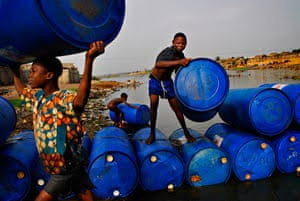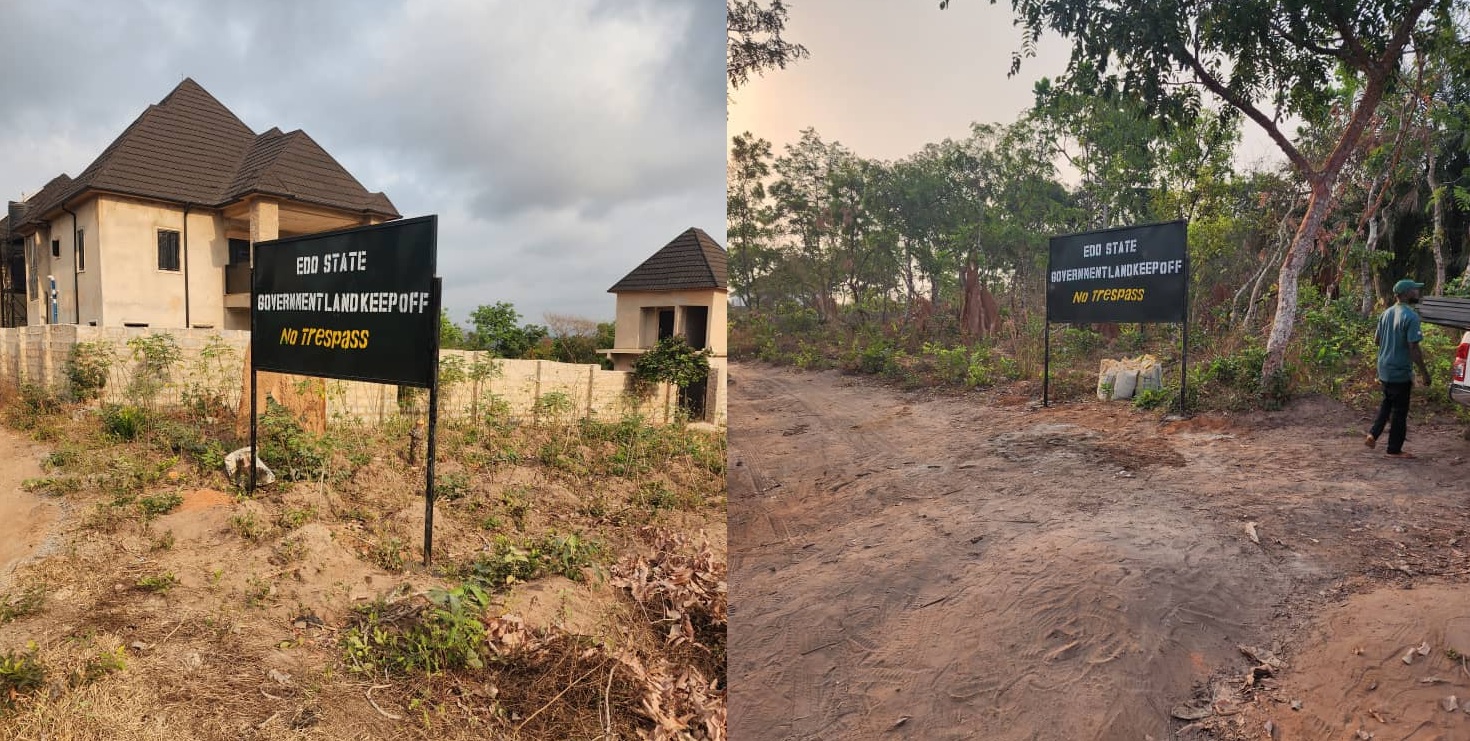News
FG unveils 150 million-litre jet fuel depot

By Francesca Hangeior
The Minister of Aviation and Aerospace Development, Festus Keyamo, has unveiled the Joint User Hydrant Installation 2 (JUHI-2) with a storage capacity of 150 million litres of Jet A1 fuel.
The facility is described as the largest airside jet fuel depot in Nigeria, having the capability of delivering a minimum of 150 million litres of ATK supplies monthly to airlines, implying that it can deliver 20 per cent of the current nation’s annual sales volume in a month.
The depot is a collaborative project by a consortium of companies, including Eterna Plc, Masters Energy Oil & Gas, Techno Oil & Gas, Rahamaniyya Oil & Gas, Ibafon Oil, Quest Oil Group, and First Deep Water Limited.
Speaking during the commissioning ceremony held at the JUHI-2 ventures limited premises, Ikeja in Lagos on Thursday, Keyamo lauded the project, saying it has brought Nigeria global relevance and recognition.
He noted that the facility would help curb the issue of flight delays and flight cancellations which most times had been a result of a lack of Jet A1 fuel.
According to the minister, the depot was strategically well positioned as it is close to both the local and international airports, which is an international requirement.
He said, “This facility is strategic and supportive to the aviation ecosystem in Nigeria. We normally experience a lot of flight cancellations, and flight delays and in some cases, it is attributed to lack of Jet A1 fuel.
“It is also an international requirement. You have just made us globally relevant because it requires that this kind of facility should not be far away from all major airports in the world.
“It is also a requirement for hajj operations. Before any airport is approved for hajj operations, they ensure that such facilities are very close to the airport. In so many ways this is a global requirement and I thank you sincerely from the bottom of my heart for this massive infrastructural investment to support the aviation ecosystem in Nigeria.”
Disclosing the recent feats in the aviation sector, the minister said Nigeria has been removed from the watchlist of non-compliant countries, having scaled 75.5 per cent in aircraft financing from 70.5 per cent.
He stated that airlines in Nigeria can now access aircraft on dry leases all over the world.
In her address, the Chairman of JUHI-2 Limited, Patience Dappa, explained that the facility will strengthen the nation’s energy security and provide a reliable and robust jet fuel supply chain.
Dappa, a legal practitioner, stated that the depot would ensure rapid response times and faster refuelling processes, reducing delays and improving overall flight scheduling, to enhance the competitiveness of airports and airlines, positioning Nigeria as a regional leader in aviation.
She said, “This facility is equipped with state-of-the-art filtration systems, a jet fuel discharge system capable of loading four bowsers simultaneously, a modern laboratory, and cutting-edge fire prevention measures. It is a strategic asset, designed to provide a steady, reliable supply of jet fuel to Murtala Muhammed International Airport, MMA1, MMA2, and nearby airbases.
“In building JUHI-2, we are not only enhancing infrastructure; we are laying the foundation for Nigeria’s continued growth in aviation. This facility will serve airlines, cargo carriers, private jet operators, and other aviation stakeholders, ensuring world-class fuel service and maximising operational efficiency. In essence, we are not just fueling planes; we are fueling the future of aviation in Nigeria.
“Beyond its operational significance, JUHI-2 will generate numerous benefits for Nigeria. It will create direct and indirect employment opportunities, contributing to a reduction in unemployment within the region. It will also stimulate economic growth by boosting related industries such as transportation, logistics, and maintenance services. This facility will play a pivotal role in the development of the airport area and its surrounding communities.”
The Managing Director/Chief Executive Officer of Eterna Oil Plc, Abiola Lawal, said JUHI-2 is equipped with cutting-edge technology that guarantees the highest standards of operational efficiency.
Lukman added that JUHI-2 can take delivery of four bridgers/aviation fuel trucks at a time which is the first of its kind in Nigeria today.
News
Video/Photos: EdoGIS blows hot warns land grabbers, signposts govt acquired lands

The Edo Geographic Information Service (EDOGIS) has warned against the activities of land grabbers and encroachers in the Auchi area, saying there will be consequences over such illegal activities.
In a video also, the government agency captured areas demarcated as government acquired lands.
The agency last week mounted signposts indicating the perimeter of the government acquisition in old and new GRA against the backdrop of repeated encroachment into the area by unknown members of the community in Auchi.
In all, there were signposts indicating “Edo State Government Land, Keep off, No Trespass” placed at very strategic locations around the perimeter of the Government Acquisition.
The exercise also marks the 2nd phase of the Action Plan put together by Edo state government to forestall further encroachment.
The first phase involved a Stakeholders meeting with the leaders of Auchi Community and the traditional rulers with government officials.
The entire area measuring 400 Hectares which remains under Government Acquisition.
According to the Edo State Land Administration and GIS Law 2024, section 49 (10), any person who trespasses, sells, trades, develops or by any means disposes of any land duly acquired by the Government to a third party without due authourization from the relevant Government Authourity, commits an offence and shall be prosecuted according to law and or face outright demolition of such properties if any.
According to a statement by the media officer of Edo GIS, Muyiwa Akinsanya, the government will soon begin profiling of such illegal structures on government Acquisition on lands in Auchi and other parts of the state.
He warned the general public from acquiring properties from land grabbers, saying the law would someday take its proper course as ignorance was no excuse under the law.
Watch video below:
https://www.instagram.com/reel/DGctlgdKo6J/?igsh=MTc4MmM1YmI2Ng==
See photos below:





News
Residents express concern over return of Turji, as DHQ officials keep mum

The Defence Headquarters has remained silent following the return of terrorist kingpin, Bello Turji, which has sparked panic among residents of Sokoto State.
In separate operations conducted in January 2025, the military announced the killing of Aminu Kanawa, the second-in-command to Turji, along with 31 other fighters and Turji’s son.
The DHQ also reported that troops inflicted serious injuries on some of Turji’s close allies, including his younger brother.
The military stated that Turji fled during one of the operations, calling him a coward for abandoning his son and fighters during the gun battle.
However, a member of the Sokoto State House of Assembly representing Sabon Birni Local Government, Aminu Boza, told journalists last week that Turji had resurfaced in Sokoto State and imposed a N25m levy on villages.
He also revealed that Turji had set up camp in a forest in the Isa Local Government Area.
“Bello Turji is currently in the Isa and Sabon Birni axis of Sokoto. He has even imposed a N25m levy per village in some communities,” Boza said, adding that Turji had been collecting taxes from the local population.
Turji’s re-emergence has heightened fears among residents who have long suffered from the activities of bandits in Sokoto and neighboring areas.
Efforts to reach the Director of Media Operations, Maj. Gen. Markus Kangye, for comments on what the military is doing to allay residents’ fears proved abortive.
Calls and messages to his line from last Thursday through Sunday had yet to be answered at the time of filing this report.
Meanwhile, Sokoto State Governor, Dr. Ahmed Aliyu, has reiterated his administration’s unwavering commitment to tackling insecurity in the state.
Speaking on Saturday at a security summit organised by the Movement for Social Justice in collaboration with the Sokoto State Government, Aliyu emphasised the need for accountability and transparency in security management.
He acknowledged the widespread security challenges facing Nigeria, which have significantly hindered the country’s economic, political, and social development.
According to him, every region in the country faces distinct security threats, with Sokoto and other North-West states grappling with banditry, kidnapping, and cattle rustling—especially in the eastern part of the state.
Governor Aliyu stated that upon assuming office, his administration swiftly implemented decisive measures to improve security through collaboration with conventional security agencies.
“Before we came into office, several communities were under the control of bandits, who dictated the terms of daily life to residents,” he said.
To address the situation, the governor outlined several proactive steps taken by his administration, which includes, “restoring security allowances previously owed to security personnel and procuring and distributing over 140 Buffalo and Hilux vans to security agencies for enhanced surveillance.”
“Providing motorcycles to the Department of State Services to improve intelligence gathering, sharing, and surveillance as well as upgrading DSS tracking equipment from 2G and 3G to 5G technology.”
Furthermore, Governor Aliyu highlighted the establishment of the Sokoto State Security Guard Corps to complement conventional security forces.
The corps, he said, had been equipped with Hilux vans, 700 motorcycles, and fully operational offices in the 13 local governments most affected by insecurity.
Additionally, the government has facilitated the full operationalisation of the Sokoto State Air Force Base by providing essential facilities, including hangars and other logistical support, to strengthen aerial surveillance and neutralise bandit hideouts.
Governor Aliyu reaffirmed his administration’s commitment to promptly addressing the needs of security agencies, emphasising that these efforts had led to a noticeable reduction in banditry.
He noted that security forces have successfully repelled several attacks, demonstrating the effectiveness of the measures put in place.
“Our administration is fully committed to ensuring the safety of Sokoto State. We are prepared to spend every last kobo in the state’s account to protect our people,” he declared.
Credit: PUNCH
News
We are achieving success as insecurity in the Northwest is diminishing – Defence Minister

Alhaji Muhammed Badaru Abubakar, Nigeria’s Minister of Defense, has reported a considerable improvement in the security situation in the Northwest and north-central regions of the country.
He ascribed this positive development to persistent and coordinated military actions against banditry, particularly in the states of Zamfara, Sokoto, Niger, Katsina, and Kaduna, where security challenges have been notably severe.
Speaking to journalists in Birnin Kudu, the headquarters of Birnin Kudu Local Government Area in Jigawa State, the minister reaffirmed the federal government’s commitment to completely eradicating insurgency before the year ends.
According to him, various stakeholders—including opinion leaders, civil society organizations (CSOs), and local residents—have acknowledged a noticeable reduction in terrorist and bandit activities.
“From the feedback we are receiving, people across the affected areas are confirming that the security situation has improved significantly. However, despite these positive developments, we remain committed to building on these achievements,” he said.
He further emphasized that the government is prioritizing adequate logistical support for the armed forces to ensure they have all necessary resources to maintain and enhance security efforts throughout the year.
-

 News16 hours ago
News16 hours agoEx-UFC Champion, Adesanya replies critics
-

 News22 hours ago
News22 hours agoREVEALED! Gov Fubara Accused of Paying N4.8Bn Monthly to Ikenga Ugochinyere
-

 News16 hours ago
News16 hours agoBabangida’s Book is filled with distorted facts, collection of lies, says Dele Farotimi
-

 News21 hours ago
News21 hours agoHow CBN Spent $8bn On Naira Defence Against Dollar At FX Market
-

 News21 hours ago
News21 hours agoWhy Buhari govt was shoved aside – IBB
-

 News16 hours ago
News16 hours agoSaudi Arabia donates 100 tonnes of dates to Nigeria as fasting approaches
-

 News16 hours ago
News16 hours agoNDPC Finally Secures NJI’s Support for Data Privacy Right in Nigeria
-

 News24 hours ago
News24 hours agoThai lady arrested at Lagos airport with boxes of illicit drug consignments







